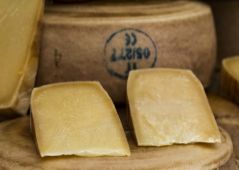Protein: coagulation

Coagulation is defined as the change in the structure of protein (from a liquid form to solid or a thicker liquid) brought about by heat, mechanical action or acids. Enzymes may also cause protein coagulation e.g. cheese making.
How does it happen?
Think about an egg. When it is heated the runny yolk and white (albumen – which is the major source of protein) turn solid. The proteins in the egg start to thicken, a process known as coagulation. Egg whites coagulate at 60°C, egg yolks 65°C, with full coagulation occurring at 70°C.
This process also happens when you cook meat. Have you noticed that when you cook a piece of meat, it shrinks? As the meat is heated, the proteins coagulate and shrink. The heat causes the muscles fibres to lose water, solidifying them. If the meat is cooked for too long the meat can become chewy.
Coagulation is irreversible, the proteins cannot be turned back into their liquid form.
Another example is heating milk. You may have noticed that when you heat milk to just below boiling point, a skin forms. This is due to the milk protein coagulating. Enzymes may also cause protein coagulation e.g. cheese making.
More information
BNF food functions factsheet: Bind
BNF food functions factsheet: Set


